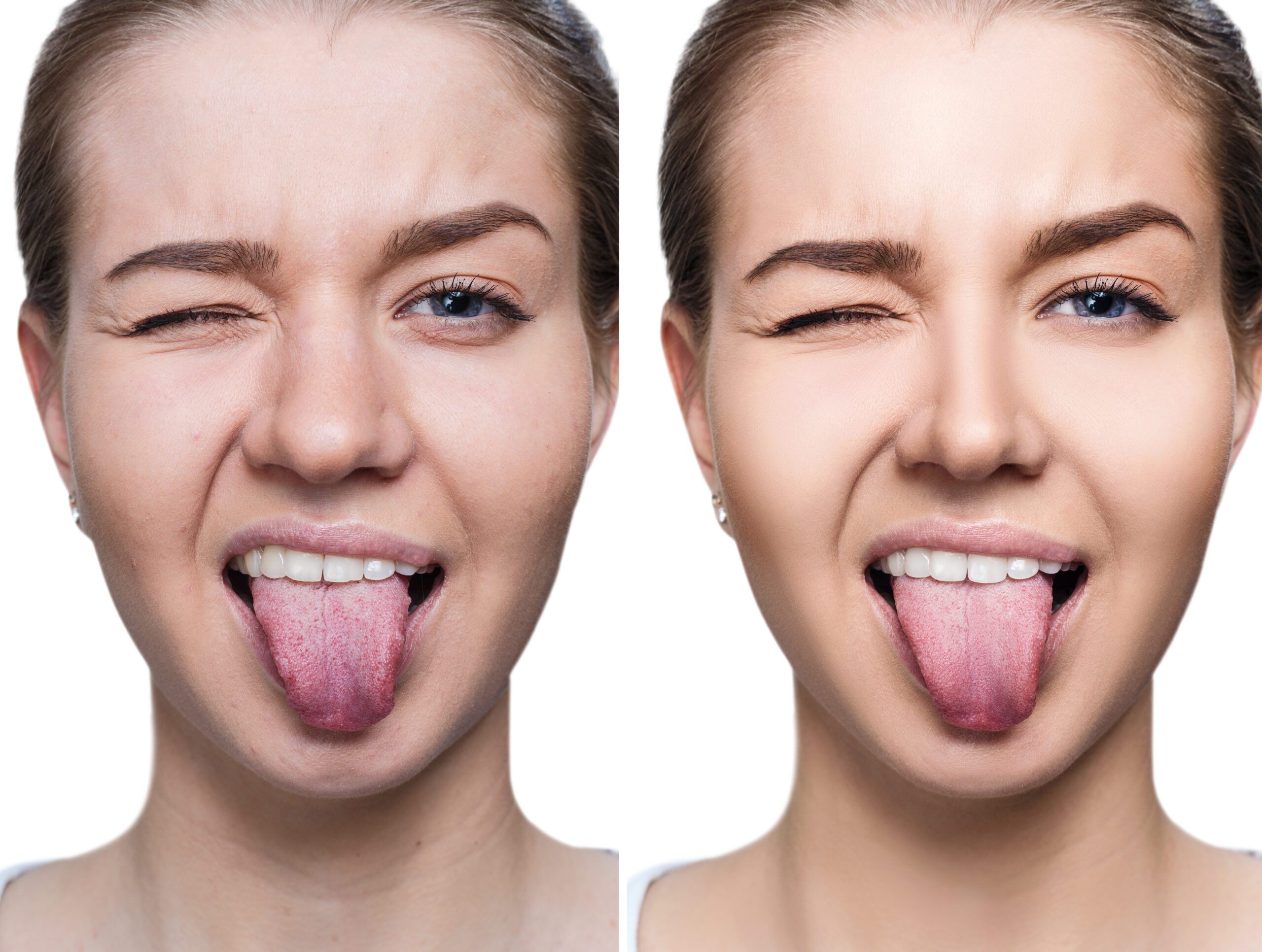The tongue is a vital organ that helps us taste and swallow food. But have you ever noticed white spots on your tongue? Most people have experienced this condition at some point in their lives. Still, it can (understandably) trigger considerable anxiety and panic.
Generally, a white spot on tongue tissue is harmless. Still, they could be a warning sign of a more serious underlying condition needing attention. White tongue spots are common and can have many different causes. Therefore, it’s essential that you understand the reasons white spots form on your tongue and how to treat them.
In this article, we’ll delve into the underlying causes of white spots on the tongue, possible visible symptoms, and available treatments.
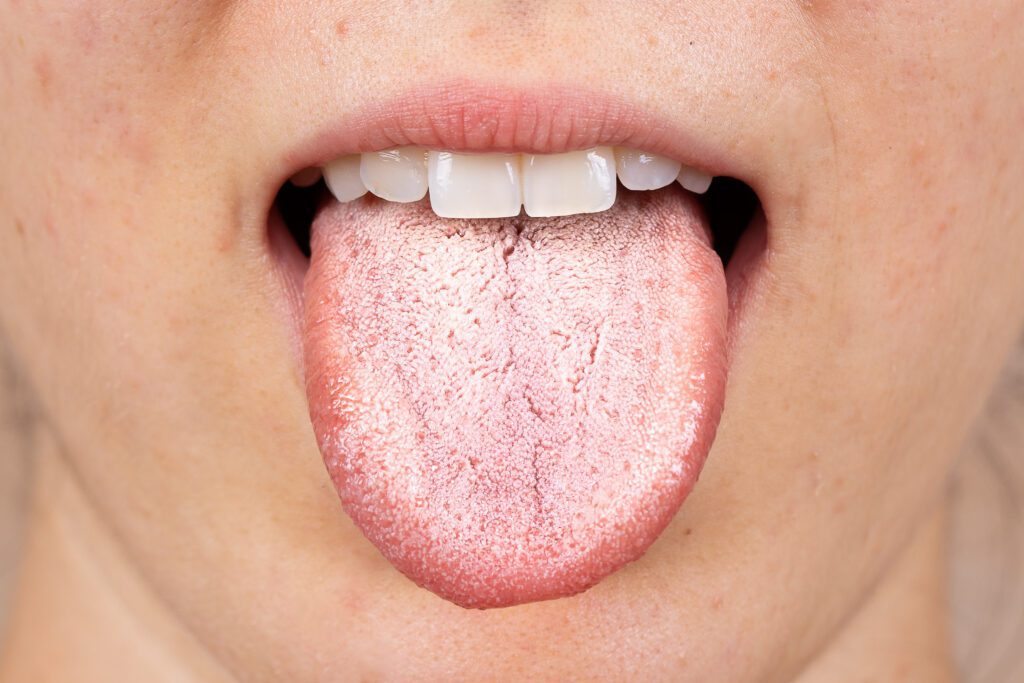
Oral Symptoms of White Spots on Your Tongue
The symptoms of white tongue spots may vary depending on the underlying cause. Generally, white spots appear as small, raised bumps that may or may not be surrounded by red or irritated areas. Generally, if you’re noticing the spots for the first time, the only symptom will be the spot itself. However, they may also be painful, cause an unpleasant taste, or you may experience difficulty eating or drinking. In some cases, these spots may bleed or become filled with pus.
Inflammation of the papillae on the tongue can lead to a burning sensation or a loss of taste. The pain can worsen when eating sour, spicy, or hot foods. Oral thrush (oral candidiasis) symptoms typically include a painful mouth and tongue with difficulty swallowing and a white appearance on just a portion or the entire tongue. In addition, Leukoplakia may develop into oral or tongue cancer in rare cases. If you are experiencing pain or other worrying symptoms while having white spots on the tongue, visit your doctor.
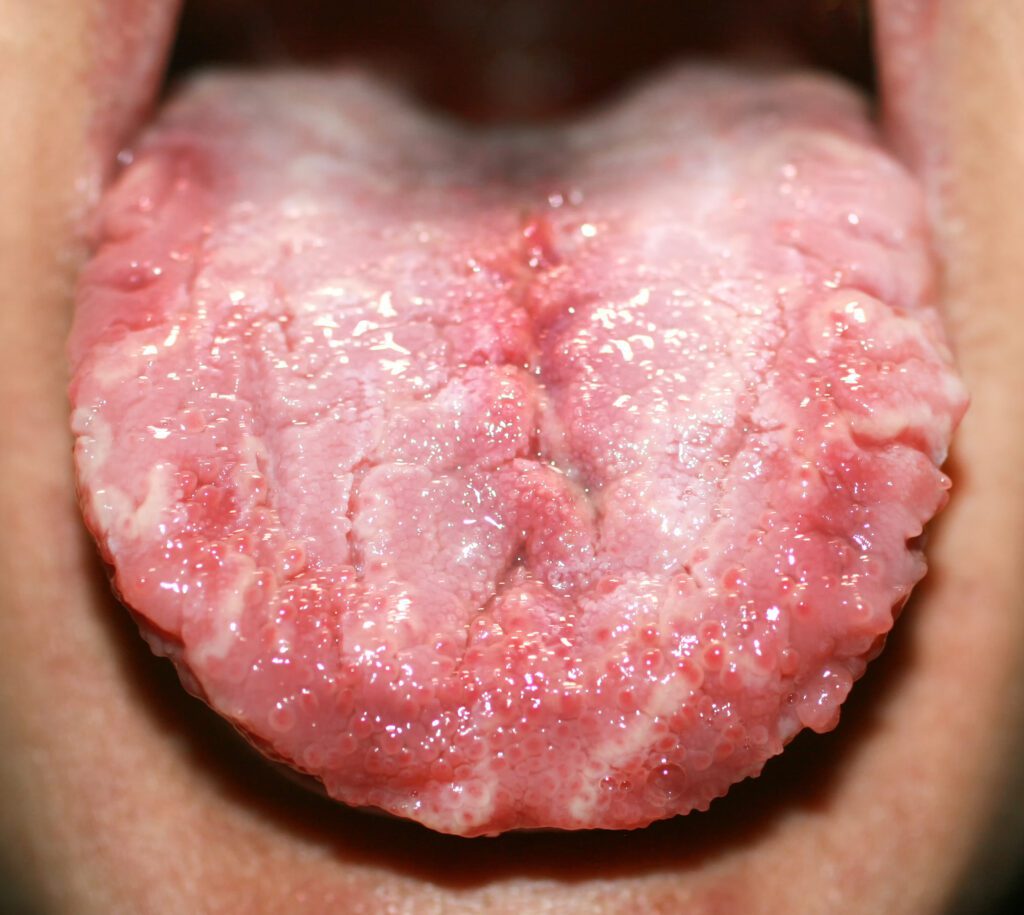
Causes of White Spots on the Tongue
Before discussing the causes of white spots on the tongue, it’s important to note that they may not present any painful symptoms. Instead, white tongue spots may be characterized by one or several bumps, ranging from tiny bumps or large patches. Some of the triggers that cause this condition include:
Poor Oral Hygiene
Sometimes, poor oral hygiene can cause white tongue spots. For example, bacteria can accumulate in your mouth and cause white spots or a white film (along with a bad taste!) if you don’t brush, floss, or use a mouth rinse regularly. This is due to an accumulation of debris stuck between the taste buds and other parts of the mouth.
Dehydration
Everyone has had dehydration leave their tongue white once or twice. Dehydration can cause a dry mouth and cracked tongue, resulting in white spots. Without enough saliva, your tongue can’t get rid of food particles, dead cells, and other bacteria or debris. Therefore, staying hydrated is essential by drinking plenty of water and avoiding dehydrating beverages such as coffee or alcohol.
Vitamin Deficiency
Vitamin B12, folic acid, or iron deficiency can also cause white tongue spots. If these vitamins are lacking in your diet, you may feel tired or experience additional symptoms. You may also develop anemia, resulting in white spots on the tongue. Therefore, speaking to your doctor about checking your nutrients if you notice white spots on your tongue is crucial.
Smoking
Smoking can cause the tongue to become inflamed and irritated, resulting in white spots. Tobacco use can also decrease saliva production, leading to further irritation and inflammation or even a condition known as “black hairy tongue.”
Vaping
Vaping can also cause irritation, tongue inflammation, a white coating on the tongue, and dehydration, resulting in white spots. In some cases, these spots may become painful or bleed easily. Therefore, it’s important to avoid vaping if you experience any discomfort that is associated with it.
Incorrect Brushing
Brushing your teeth incorrectly or vigorously can irritate the tongue, resulting in white patches. Instead, brush your teeth gently and use soft bristles.
Alcohol Consumption
Excessive alcohol consumption can also cause white spots on the tongue. Keep your alcohol intake in moderation or avoid it altogether to prevent this from happening.
Infections
Certain infections, such as herpes, syphilis (a sexually transmitted infection caused by a bacterial infection), tongue infections, or mononucleosis, can also cause white spots on the tongue. If you experience any further symptoms along with the white spots, it’s important to seek medical attention immediately to keep your mouth healthy.
Geographic Tongue
Also known as benign migratory glossitis, this appears as white or reddish patches on the tongue and may form patterns that mimic shapes on a map. This condition is quite common and harmless but may cause a burning sensation. The cause of migratory glossitis is unknown, but certain foods, irritants, medications, or stress can aggravate it.
Oral Thrush
Thrush is a yeast infection caused by Candida yeast in the oral cavity, affecting the tongue and tonsils. It presents as a white coating of curdled patches on the tongue and the throat lining at the back of our mouth. This fungal infection can affect anyone but is more common in people with weakened immune systems or those who use inhalers for asthma.
Papillae Inflammation
Inflammation of the tongue papillae can cause white spots, leading to painful Beur Tongue Syndrome. Papillae are tiny protrusions on the tongue that hold taste buds. They can become inflamed for various reasons, including local trauma, poor oral hygiene, smoking, or eating sharp foods.
Beur Tongue Syndrome
Beur tongue syndrome, or burning tongue syndrome, is caused by an overgrowth of the papillae on the tongue’s surface, resulting in white spots. This condition can be aggravated by poor oral hygiene, smoking, dehydration, or nutritional deficiency.
Canker Sores
Canker sores are small, shallow ulcers on the tongue, gums, inner cheeks, or throat, resulting in white spots. They are usually small and round, with a white or yellow center and a red border. Canker sores typically cause pain and discomfort but can be easily treated with topical anesthetics or anti-inflammatory medications. They are not contagious and usually heal on their own, but there are over-the-counter treatments available to ease the pain.
Autoimmune Diseases
Autoimmune diseases such as Lupus, Sjorgen’s Syndrome, Crohn’s Disease, and Psoriasis can also cause white spots on the tongue. If you have an autoimmune disorder and experience any additional symptoms along with the white spots, it’s important to seek medical attention right away.
Leukoplakia
Another possible cause of white spots on the tongue is Leukoplakia, a chronic inflammatory condition where mouth cells grow excessively. This condition causes thick, white patches on the tongue, inside the cheeks, or gums. Leukoplakia can be caused by tobacco use or other irritants, and it can increase the risk of oral cancer. Therefore, you should always seek medical attention if you notice white spots that don’t go away or are accompanied by other symptoms.
Oral Lichen Planus
Oral lichen planus is an inflammatory disorder that affects the lining of the mouth and can cause a white patch on the tongue. Researchers aren’t entirely sure what causes this chronic condition, but it may be due to an immune response or genetic factors. This disorder is not contagious and can typically be treated with topical steroids or antifungal medications. However, you should seek medical attention if the condition is severe or doesn’t respond to treatment within a few weeks. In some cases, oral cancer, such as tongue cancer, can develop from this disorder, so it’s important to get checked by a doctor.
To sum up, there are a variety of potential causes for white spots on the tongue. If you notice any white spots on your tongue that won’t go away, it’s crucial to identify the underlying cause and take steps to treat it. Some conditions may require medical attention, so it’s best to consult a doctor if you have any concerns about your white spots. Treatments for these underlying causes will help reduce the discomfort associated with the white spots and prevent them from returning. Maintaining excellent oral hygiene and practicing healthy lifestyle habits are also important to help reduce the risk of developing white spots on the tongue.
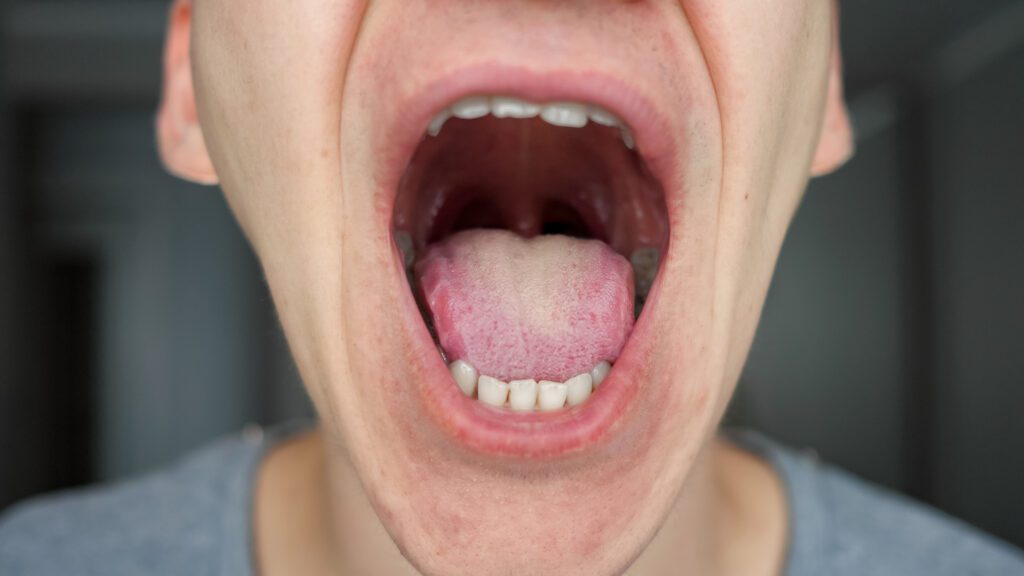
How Do You Treat White Spots on the Tongue?
The different causes of white spots on the tongue require various treatments. Treatment typically targets the root cause, which can be managed by:
Home remedies – over-the-counter medications can help alleviate the pain caused by white patches on the tongue. Gargling with salt water or baking soda water can also help soothe the tongue.
Medications – If your white spots are caused by something more severe than dehydration or poor oral hygiene, your doctor might prescribe medication to treat the underlying cause.
Diet changes – Eating a healthy diet full of fruits and vegetables can help improve overall health and reduce the risk of developing tongue problems. Avoiding smoking or drinking alcohol can also help reduce the chances of developing white spots on the tongue.
Generally, soothing mouthwashes, rinsing the mouth with salt water, and eating more healthy foods can help get rid of food particles and debris and treat simple white spots on the tongue. However, if the white spots persist, getting a professional diagnosis from a healthcare provider is vital.

Treatment Options for White Spots on the Tongue
The treatment for white spots on the tongue will depend on the underlying cause.
If the spots persist or become more painful, seeing a doctor or a dentist is essential. They may prescribe antifungal medication or antibiotics or recommend over-the-counter medications that can help reduce inflammation or relieve pain.
Poor Oral Hygiene
Suppose the white spots are caused by poor oral hygiene. In that case, you can improve your oral hygiene routine by brushing your teeth twice daily, flossing daily, and using mouthwash to kill bacteria.
Dehydration
If the spots are caused by dehydration and a dry mouth, drinking plenty of fluids and maintaining good hydration is essential. Statistically, adults should drink at least 4-6 cups of water daily to stay hydrated.
Vitamin Deficiency
When white spots are caused by a vitamin deficiency, dietary changes, and supplements can help. Check with your healthcare provider to determine which vitamins, minerals, and supplements are best for you.
Smoking and Vaping
If the spots are caused by smoking or vaping, quitting and maintaining a tobacco-free lifestyle is important. In addition, an underlying allergy or sensitivity may be the cause, so it’s crucial to identify and avoid any potential triggers.
Incorrect Brushing
If the spots are caused by incorrect brushing, it’s important to be gentle when brushing your teeth and to use a soft toothbrush. If you’re brushing too hard (or scraping too hard with a tongue scraper!), this can cause irritation and white spots on the tongue.
Alcohol Consumption
Heavy alcohol consumption can also cause white spots on the tongue. Reducing or eliminating your alcohol intake may help reduce the symptoms.
Infections
If an infection causes white spots, your doctor might prescribe antibiotics or other medications such as antivirals and anti-inflammatory medications. Your doctor may also recommend changing your diet to reduce the risk of infection. In some cases, surgical removal of the affected area may be necessary.
Geographic Tongue
Geographic tongue is a condition that causes patches of white on the tongue. Treatment for this condition typically includes avoiding spicy or acidic foods, mouthwashes, and using a soft-bristle toothbrush. Topical steroid creams may also be prescribed to help soothe the area.
Oral Thrush
Your dentist or doctor may prescribe antifungal medication if it is due to thrush. If you suspect that oral thrush is the issue, it’s important to visit a healthcare provider as soon as possible to prevent the infection from spreading. Candida infections can also affect the throat, esophagus, and digestive systems.
Papillae Inflammation
Treatment for this condition typically includes avoiding spicy, sour, or acidic foods, mouthwashes, and using a soft-bristle toothbrush. In some cases, your doctor may prescribe topical steroids or anti-inflammatory medications to help soothe the area.
Beur Tongue Syndrome
This condition can be treated with medications such as antibiotics, antifungals, and antivirals. In addition, topical benzocaine, which numbs the tongue, is a standard treatment for Beur Tongue Syndrome. Dietary changes may also be necessary to help reduce the symptoms. Additionally, it’s crucial to reduce stress levels and maintain excellent oral hygiene.
Canker Sores
Over-the-counter medications such as topical anesthetics or anti-inflammatory drugs can help reduce pain and inflammation for canker sores. In addition, it’s important to avoid spicy or acidic foods, mouthwashes, and tobacco products. Contrary to popular belief, canker sores are not contagious, cannot be spread through saliva, and only occur inside the mouth.
Autoimmune Diseases
Suppose your white tongue spots are due to a weakened immune system caused by an autoimmune disorder. In that case, medications may be prescribed to help manage your condition. Additionally, maintaining a healthy diet, taking supplements, and reducing stress can all help manage the symptoms of autoimmune disorders in your entire body. It’s essential to have access to a medical professional who can help manage your condition and recommend the best course of treatment.
Leukoplakia
Leukoplakia may require further treatment, such as topical steroids, cryotherapy, or laser treatment, to surgically remove the patches, depending on the severity of the condition. Additionally, quitting smoking and reducing the amount of alcohol you consume may help relieve symptoms. It’s important to visit a doctor immediately if Leukoplakia is suspected.
Oral Lichen Planus
This disorder may require medication, such as topical corticosteroids, steroid pills dissolved into a mouthwash, or immunosuppressants, to reduce inflammation and discomfort. In addition, it’s essential to keep your mouth clean and avoid smoking, as well as acidic or spicy foods. Your doctor may also recommend a change in diet and lifestyle to help reduce the symptoms.
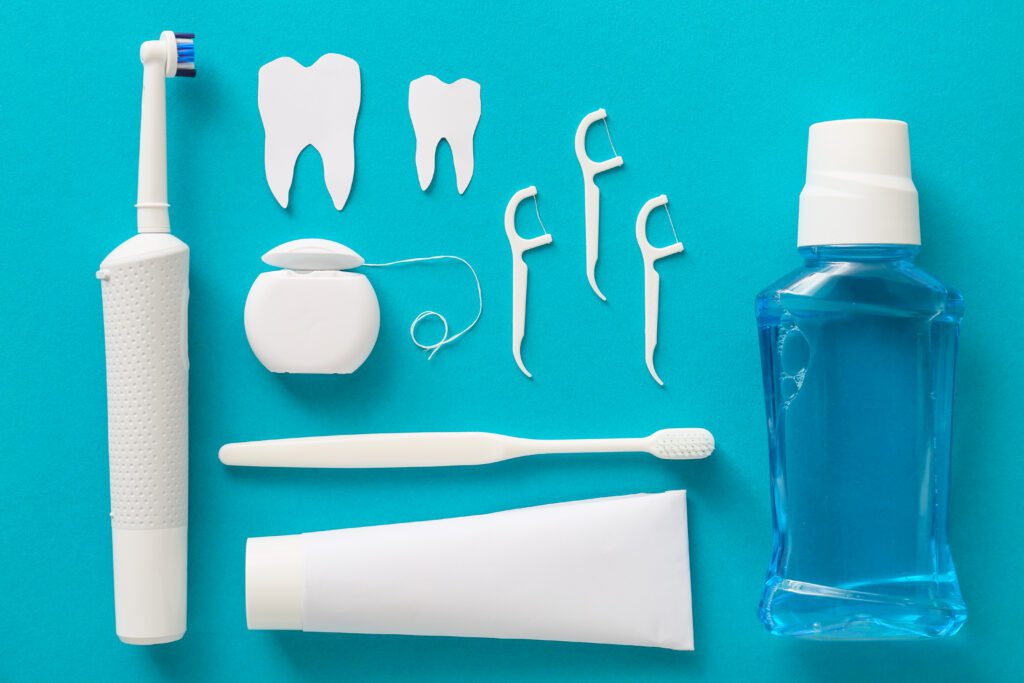
Preventing White Spots from Developing
Although white tongue spots may seem like an uncontrollable condition, specific lifestyle changes can help prevent it from happening. Some of the best prevention tips include:
Drink plenty of water – Severe dehydration can make a tongue white. Consistent hydration can prevent the growth of bacteria on the tongue.
Practice good dental hygiene – Brushing and flossing regularly can prevent bacteria from accumulating in the mouth and causing white tongue spots.
Avoid smoking or chewing tobacco (including vaping!) – Tobacco use is correlated with many ailments, including white tongue spots. Therefore, you should avoid it altogether, and if you can’t abstain, limit your consumption to prevent or minimize white patches.
Avoid excessive alcohol consumption – Drinking too much alcohol can irritate the papillae, leading to inflammation and potential white tongue spots.
Maintain a healthy diet – A balanced diet containing fresh fruits and vegetables is also essential t to maintain the proper levels of vitamins and minerals necessary for preventing oral infections like candidiasis and Leukoplakia.
It’s essential to take preventive measures and maintain good oral hygiene practices and a healthy lifestyle to avoid developing white spots.
When Should You See a Healthcare Provider?
In most cases, white tongue spots are not a cause for concern. However, if you are concerned about white tongue spots or if they last longer than two weeks or are painful, it is crucial to see a healthcare professional. Additionally, seek medical attention immediately if you notice any other symptoms, such as bleeding, bad breath, fever, difficulty swallowing, or weight loss. A medical professional, such as your family doctor or dentist, can examine your tongue and determine the underlying cause of the white tongue spots.
Your dentist may recommend tests or a biopsy to determine the underlying cause of the white tongue spots. They may take a culture to confirm the diagnosis if oral thrush is suspected. Treatment will depend on the underlying cause of the white tongue spots.

Conclusion
White tongue spots are not always a serious health concern, but they can be a symptom of an underlying condition. White tongue spots should not be ignored. It is important to understand the underlying causes and treatment options available. With proper diagnosis and medical treatment, they can often be resolved.
Preventive measures such as practicing good oral hygiene, avoiding smoking and alcohol consumption, and eating a balanced diet are crucial steps in preventing white tongue spots altogether. However, if you notice any unusual changes in your mouth or white tongue spots that don’t go away, are painful, or are accompanied by additional symptoms, it’s important to see a healthcare professional for an evaluation to rule out any severe underlying conditions.
The mouth is an integral part of the human body! Always take care of your oral health by brushing and flossing regularly, and ensure you get enough vitamins and minerals in your diet. Remember, prevention is key!
We can keep our mouths and bodies healthy by caring for our oral health.
If you have any concerns about your oral health, don’t hesitate to contact Patient Empowered Dentistry! We’d love to book you an appointment!
